Air heating systems offer numerous green advantages for your home or business. They considerably reduce your carbon footprint by using ambient air as a renewable heat source, decreasing reliance on fossil fuels. You'll enjoy lower energy bills thanks to increased efficiency and even heat distribution. These systems improve indoor air quality by filtering allergens and pollutants, while maintaining consistent humidity levels. With minimal maintenance requirements and silent operation, air heating provides long-term cost savings and comfort. Eco-friendly materials and versatile installation options make them suitable for various settings. Discover how this efficient, year-round solution can transform your space into a greener, more comfortable environment.
Reduced Carbon Footprint
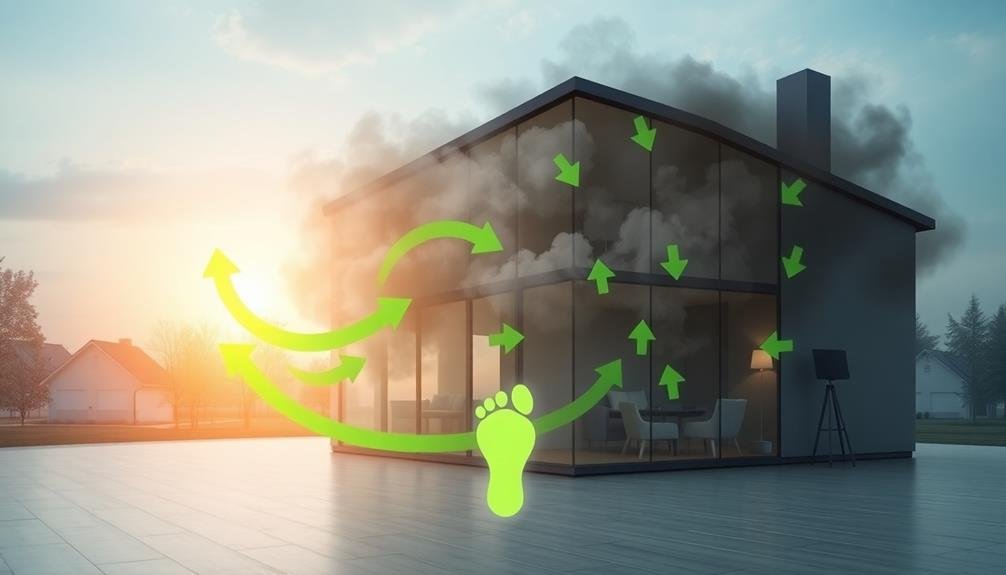
In recent years, air heating systems have emerged as a promising solution for reducing your carbon footprint. These systems use ambient air as a heat source, which is a renewable and clean energy option. By harnessing the natural heat in the air, you're not relying on fossil fuels for warmth, greatly cutting down on greenhouse gas emissions.
Air heating systems, such as air source heat pumps, can be up to 300% efficient, meaning they produce three units of heat for every unit of electricity consumed. This high efficiency translates to lower energy consumption and, consequently, reduced carbon emissions.
You'll also find that these systems can be powered by renewable electricity sources like solar or wind, further minimizing your environmental impact.
When you switch from a traditional gas or oil heating system to an air heating solution, you're potentially cutting your home's carbon emissions by up to 50%. This substantial reduction helps combat climate change on an individual level.
Additionally, air heating systems don't require fuel storage or regular fuel deliveries, eliminating the carbon footprint associated with transportation and storage of fossil fuels.
Renewable Energy Source
Building on the carbon-reducing benefits of air heating systems, let's explore their renewable energy source. Air heating systems can harness renewable energy from the air around us, making them an eco-friendly option for your home or business.
These systems use heat pumps to extract warmth from the outside air, even in colder temperatures, and transfer it indoors. You'll find that air source heat pumps can work efficiently in temperatures as low as -15°C, providing a reliable heating solution year-round.
By tapping into this abundant and renewable resource, you're reducing your reliance on fossil fuels and embracing a more sustainable energy option.
Moreover, when you combine air heating systems with solar panels or wind turbines, you're creating a powerful synergy of renewable energy sources. This combination can greatly decrease your dependence on the grid and further lower your carbon footprint.
You'll also benefit from potential energy cost savings in the long run, as you're using freely available air to heat your space.
Lower Energy Bills

You'll enjoy lower energy bills with air heating systems that reduce fossil fuel consumption.
These systems efficiently distribute heat throughout your home, ensuring every room stays comfortable without wasting energy.
Reduced Fossil Fuel Consumption
By switching to air heating systems, you'll considerably reduce your reliance on fossil fuels. Air heating systems, particularly those powered by electricity, can tap into renewable energy sources like solar, wind, or hydroelectric power. This shift away from traditional oil or gas furnaces directly impacts your carbon footprint, as you're no longer burning fossil fuels on-site to heat your home.
Many regions are increasingly incorporating renewable energy into their power grids, meaning your electric air heating system becomes cleaner over time without any additional effort on your part. You're also future-proofing your home, as air heating systems can easily adapt to greener energy sources as they become available.
Moreover, air heating systems are typically more efficient than their fossil fuel counterparts, converting a higher percentage of energy into heat. This efficiency translates to less overall energy consumption, further reducing the demand for fossil fuels.
Efficient Heat Distribution
Air heating systems not only reduce fossil fuel consumption but also excel in efficient heat distribution throughout your home. These systems use a network of ducts to circulate warm air evenly, ensuring consistent temperatures in every room.
Unlike traditional radiators that create hot and cold spots, air heating provides uniform comfort.
You'll notice improved energy efficiency as the system quickly warms your space. The rapid heat distribution means you won't need to run the system for extended periods to achieve desired temperatures. This efficiency translates directly into lower energy bills, as you'll use less power to maintain a comfortable environment.
Air heating systems also allow for precise temperature control. With zoned heating options, you can adjust temperatures in different areas of your home independently.
This flexibility means you're not wasting energy heating unused rooms. Additionally, modern air heating systems often incorporate smart thermostats, which learn your preferences and optimize heating schedules.
These features further enhance efficiency by automatically adjusting temperatures based on your daily routines and occupancy patterns.
Smart Thermostat Integration
In recent years, smart thermostats have revolutionized air heating systems, offering unprecedented control and energy savings. These intelligent devices integrate seamlessly with your air heating system, allowing you to optimize your home's temperature and energy consumption.
Smart thermostats learn your preferences and routines, automatically adjusting temperatures throughout the day. You'll no longer waste energy heating an empty house, as these devices can detect when you're away and adjust accordingly.
Many models also offer geofencing capabilities, turning on your heating system as you approach home. You can control your heating remotely via smartphone apps, ensuring your home is warm when you arrive.
Some smart thermostats even consider local weather forecasts to optimize heating schedules. They provide detailed energy reports, helping you identify areas for improvement and track your savings over time.
Improved Indoor Air Quality
Air heating systems offer significant benefits for your indoor air quality.
You'll notice a reduction in allergens and pollutants as these systems effectively filter the air circulating through your home.
Additionally, you can maintain consistent humidity levels, creating a more comfortable and healthier living environment year-round.
Reduced Allergens and Pollutants
A considerable advantage of air heating systems is their ability to improve indoor air quality by reducing allergens and pollutants. These systems often incorporate advanced filtration technologies that can capture and remove airborne particles, including dust, pollen, pet dander, and mold spores. As air circulates through the heating system, it passes through these filters, effectively cleansing the air you breathe.
You'll find that many modern air heating systems use HEPA (High-Efficiency Particulate Air) filters, which can trap particles as small as 0.3 microns with 99.97% efficiency. This level of filtration can considerably reduce the presence of common indoor allergens, potentially alleviating symptoms for those with allergies or respiratory issues.
Additionally, some air heating systems feature UV light purification, which can neutralize harmful microorganisms like bacteria and viruses. This extra layer of protection further enhances indoor air quality, creating a healthier living environment for you and your family.
Consistent Humidity Control
Consistent humidity control stands out as another significant benefit of air heating systems. When you use air heating, you'll find it easier to maintain ideal indoor humidity levels throughout your home. This is essential for both your comfort and the health of your living space.
Air heating systems often come equipped with built-in humidifiers or dehumidifiers, allowing you to fine-tune the moisture content in your air. By keeping humidity levels between 30% and 50%, you'll create an environment that's less hospitable to mold, dust mites, and other allergens.
You'll also protect your home's structure and furnishings from moisture-related damage. In winter, when indoor air tends to become dry, your air heating system can add moisture to prevent issues like dry skin, static electricity, and respiratory irritation.
Conversely, during humid summer months, it can remove excess moisture, making your home feel cooler and more comfortable. This consistent humidity control not only improves your indoor air quality but also helps your heating system operate more efficiently.
You'll likely notice reduced energy consumption and lower utility bills as a result of this improved performance.
Minimal Maintenance Requirements

One of the most appealing aspects of air heating systems is their minimal maintenance requirements. You'll find that these systems are relatively simple and have fewer moving parts compared to traditional heating methods. This translates to less frequent repairs and lower maintenance costs over time.
To keep your air heating system running efficiently, you'll only need to perform a few basic tasks:
| Task | Frequency | Difficulty |
|---|---|---|
| Replace air filter | 1-3 months | Easy |
| Clean vents | Annually | Easy |
| Check thermostat | Annually | Easy |
| Inspect ductwork | 3-5 years | Moderate |
| Professional tune-up | Annually | Professional |
By adhering to this simple maintenance schedule, you'll guarantee your system operates at peak performance. You won't need to worry about complex components like boilers or radiators, which often require specialized knowledge to maintain.
The simplicity of air heating systems also means you're less likely to encounter unexpected breakdowns. This reliability not only saves you money but also reduces the environmental impact associated with manufacturing and disposing of replacement parts. You'll appreciate the peace of mind that comes with a heating system that demands little attention while consistently delivering comfort to your home.
Long-Term Cost Savings
You'll find significant long-term cost savings with air heating systems.
Your energy bills will decrease due to reduced consumption, and you'll spend less on maintenance over time.
Furthermore, these systems typically have a longer lifespan, ensuring your investment pays off for years to come.
Reduced Energy Consumption
With air heating systems, you'll see significant reductions in energy consumption, leading to substantial long-term cost savings.
These systems operate more efficiently than traditional heating methods, using less energy to produce the same amount of heat. Air heating technology allows for precise temperature control, ensuring you're not wasting energy heating unoccupied spaces or overheating rooms.
You'll benefit from the system's ability to quickly adjust to temperature changes, reducing the energy needed to maintain a comfortable environment.
Many air heating systems also incorporate heat recovery technology, which captures and reuses waste heat, further increasing efficiency.
Additionally, these systems often come with programmable thermostats, allowing you to set different temperatures for various times of the day, optimizing energy use based on your schedule.
Lower Maintenance Expenses
Air heating systems' maintenance requirements are considerably lower than those of traditional heating methods, contributing to long-term cost savings.
You'll find that these systems have fewer moving parts and components, reducing the likelihood of breakdowns and the need for frequent repairs. This simplicity translates to less time and money spent on upkeep, allowing you to enjoy a more reliable and cost-effective heating solution.
The lower maintenance expenses of air heating systems offer several benefits:
- Reduced service calls and technician visits
- Fewer replacement parts needed over the system's lifetime
- Lower risk of unexpected breakdowns and emergency repairs
- Extended overall lifespan of the heating system
Increased System Longevity
Because air heating systems have fewer components and moving parts, they typically enjoy a longer lifespan compared to traditional heating methods. You'll find that these systems can last up to 20 years or more with proper maintenance, considerably outlasting conventional heating options. This increased longevity translates to fewer replacements over time, reducing waste and the environmental impact associated with manufacturing and disposing of heating equipment.
The durability of air heating systems also means you'll spend less on repairs and replacements in the long run. This extended lifespan contributes to substantial cost savings over the system's lifetime, making it an environmentally and economically sound choice for your home or business.
| System Type | Average Lifespan | Replacement Frequency |
|---|---|---|
| Air Heating | 20+ years | Every 20-25 years |
| Furnace | 15-20 years | Every 15-20 years |
| Boiler | 10-15 years | Every 10-15 years |
Increased Property Value

Installing an air heating system can greatly boost your property's value. As energy efficiency becomes increasingly important to homebuyers, having a modern, eco-friendly heating solution can make your home more attractive in the real estate market.
Air heating systems are known for their low carbon footprint and energy-saving capabilities, which can considerably reduce utility costs for potential buyers.
When you invest in an air heating system, you're not just improving your home's comfort; you're also making a smart financial decision.
Here's how an air heating system can increase your property value:
- Lower energy bills attract cost-conscious buyers
- Green features appeal to environmentally aware purchasers
- Modern heating systems suggest a well-maintained home
- Improved indoor air quality can be a selling point
Real estate agents often highlight energy-efficient features in property listings, as they know these aspects can command higher prices.
By installing an air heating system, you're positioning your home as a forward-thinking, sustainable living space. This can give you an edge in a competitive market and potentially lead to a faster sale at a better price.
Energy Independence
While many heating systems rely heavily on external energy sources, air heating systems offer a path towards greater energy independence. By harnessing the ambient air, you're less dependent on traditional fuel sources like oil or natural gas. This reduction in reliance on external energy providers can lead to long-term cost savings and increased control over your heating needs.
Air heating systems, particularly when paired with renewable energy sources like solar panels, can greatly boost your energy independence. You'll be less affected by fluctuations in fuel prices or supply chain disruptions. Here's a comparison of energy independence levels for different heating systems:
| Heating System | Energy Independence | Renewable Potential |
|---|---|---|
| Air Heating | High | Excellent |
| Natural Gas | Low | Limited |
| Oil Heating | Very Low | Poor |
Reduced Fossil Fuel Reliance

Building on the concept of energy independence, air heating systems considerably reduce reliance on fossil fuels. By harnessing the ambient air's thermal energy, these systems minimize the need for traditional heating methods that typically rely on oil, gas, or coal.
This shift away from fossil fuels brings numerous environmental benefits and helps combat climate change.
When you choose air heating, you're actively participating in the shift to cleaner energy sources. Here's how air heating reduces fossil fuel dependence:
- It utilizes renewable energy from the air, which is constantly replenished
- Electric-powered heat pumps can be paired with solar panels for even greener operation
- Air-source heat pumps work efficiently in various climates, reducing the need for backup fossil fuel systems
- The technology continually improves, further decreasing reliance on non-renewable resources
Silent Operation
How often have you wished for a heating system that doesn't disrupt your peace and quiet? Air heating systems offer just that, with their silent operation being a significant green advantage. Unlike traditional heating methods that may produce noticeable sounds, air heaters work quietly in the background, allowing you to enjoy a comfortable environment without disturbance.
The silent operation of air heating systems stems from their design and functionality. They don't rely on noisy combustion processes or the circulation of water through pipes, which can often create unwanted sounds. Instead, they use efficient air circulation techniques that produce minimal noise.
This quiet performance is particularly beneficial in residential settings, where noise pollution can affect your quality of life and sleep patterns.
Moreover, the silent operation contributes to a more sustainable living environment. You won't feel the need to compensate for noise by increasing TV volumes or using white noise machines, which consume additional energy.
The absence of noise also reduces stress levels, promoting overall well-being and potentially decreasing reliance on energy-consuming stress-relief devices. By choosing air heating, you're opting for a solution that respects both the environment and your auditory comfort.
Eco-Friendly Materials
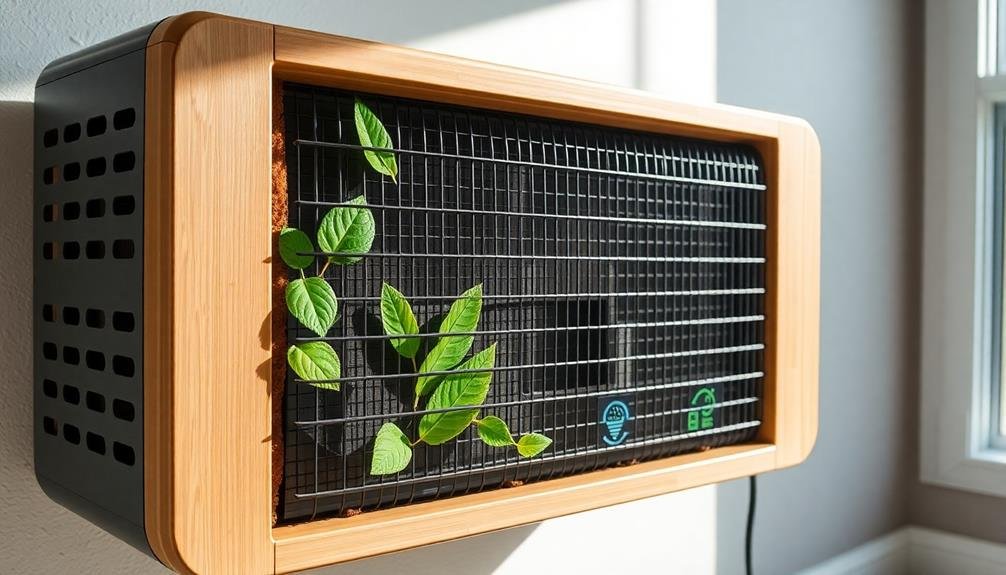
Air heating systems don't just excel in quiet operation; they're also leading the way in eco-friendly materials. Manufacturers are increasingly using sustainable and recyclable components in their products, reducing the environmental impact of heating systems.
You'll find that modern air heaters often incorporate:
- Recycled metals for casings and internal parts
- Biodegradable lubricants and coolants
- Non-toxic insulation materials
- Low-VOC paints and coatings
These eco-friendly materials contribute to a cleaner manufacturing process and easier disposal at the end of the system's life cycle.
You're not only getting an efficient heating solution but also supporting responsible resource management.
When shopping for an air heating system, look for units certified by environmental organizations. These certifications guarantee the product meets strict standards for material sourcing and production methods.
Versatile Installation Options
One of the most significant advantages of air heating systems is their versatile installation options. You'll find that these systems can be easily integrated into various building types, from residential homes to large commercial spaces. Unlike traditional heating methods that require extensive ductwork, air heating systems offer flexibility in placement and design.
You can install air source heat pumps outside your building, where they'll efficiently extract heat from the surrounding air. These units don't need much space and can be positioned discreetly.
For indoor installation, you've got options like wall-mounted units or ceiling cassettes that blend seamlessly with your décor.
Ductless mini-split systems are another versatile choice. They allow you to heat specific zones in your building without the need for complex ductwork. This zoning capability means you're not wasting energy heating unused areas.
If you're retrofitting an older building, you'll appreciate how air heating systems can be installed with minimal structural changes. They're also ideal for new constructions, as their compact design frees up valuable space.
Whether you're dealing with a small apartment or a sprawling office complex, air heating systems offer adaptable solutions to meet your specific needs.
Year-Round Efficiency

Throughout the year, air heating systems prove their worth by offering exceptional efficiency. You'll find that these systems adapt seamlessly to changing seasons, providing consistent comfort while minimizing energy consumption. During colder months, they efficiently heat your space, and in warmer weather, they can be reversed to cool your home effectively.
The year-round efficiency of air heating systems stems from several key factors:
- Advanced heat pump technology that transfers heat rather than generating it
- Precise temperature control through zoning capabilities
- Ability to dehumidify spaces, improving overall air quality
- Integration with smart home systems for optimized performance
You'll appreciate how these systems maintain their efficiency even in extreme temperatures. Unlike traditional heating methods, air heating systems don't lose effectiveness as outdoor temperatures drop. This consistent performance guarantees you're not wasting energy or money when you need heating the most.
Additionally, the dual heating and cooling functionality means you're investing in a single system that serves multiple purposes, reducing the need for separate appliances and lowering your overall carbon footprint.
Frequently Asked Questions
How Does Air Heating Compare to Geothermal Heating in Terms of Efficiency?
You'll find air heating is generally less efficient than geothermal heating. While air heating systems are simpler and cheaper to install, geothermal systems use the earth's constant temperature, making them more energy-efficient and cost-effective in the long run.
Can Air Heating Systems Be Integrated With Existing HVAC Infrastructure?
Yes, you can integrate air heating systems with existing HVAC infrastructure. They're often compatible with ductwork and controls you already have. You'll need to verify your current system can handle the new air heating components.
What Government Incentives Are Available for Installing Air Heating Systems?
You'll find various government incentives for installing air heating systems. These can include tax credits, rebates, and grants at federal, state, and local levels. Check with your local energy office for specific programs available in your area.
How Does Climate Affect the Performance of Air Heating Systems?
Climate considerably impacts your air heating system's performance. You'll find it works best in moderate climates. In extreme cold, it's less efficient, while in hot areas, you won't need it as much. Consider your local weather patterns.
Are There Any Potential Health Risks Associated With Air Heating Systems?
You should be aware of potential health risks with air heating systems. They can circulate dust, allergens, and dry air, leading to respiratory issues. Regular maintenance and proper humidity control can mitigate these concerns for you.
In Summary
You've discovered the numerous green advantages of air heating. From reducing your carbon footprint to lowering energy bills, you're making an eco-friendly choice. You'll enjoy improved indoor air quality and minimal maintenance, all while using renewable energy. The silent operation and versatile installation options make it even more appealing. With year-round efficiency and eco-friendly materials, you're not just heating your home; you're contributing to a more sustainable future. It's a smart, green solution for modern living.
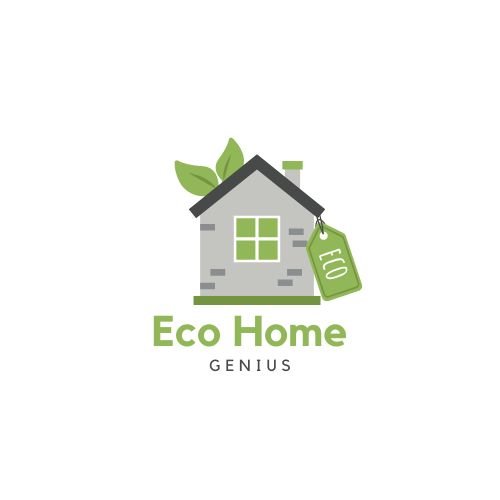

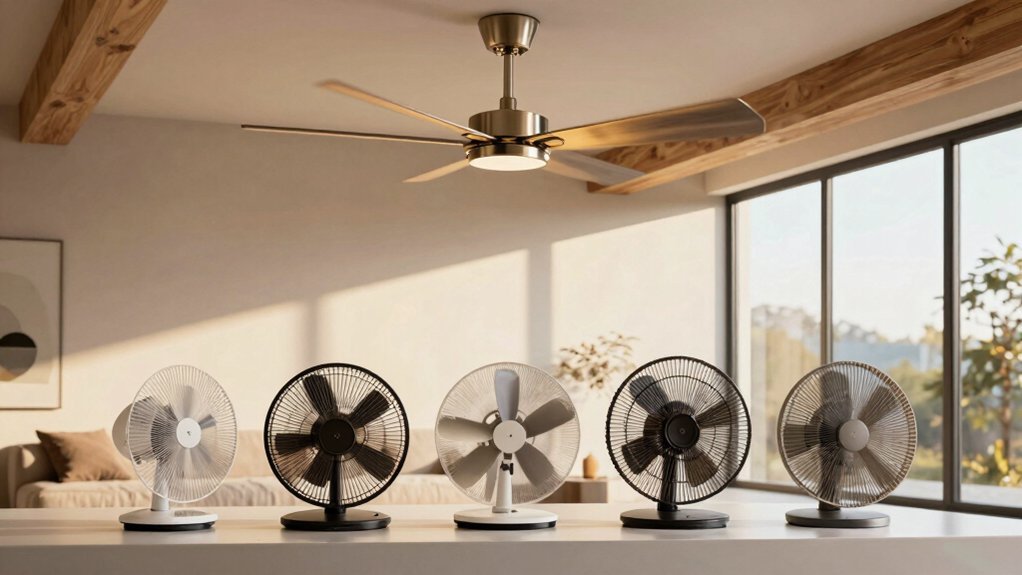
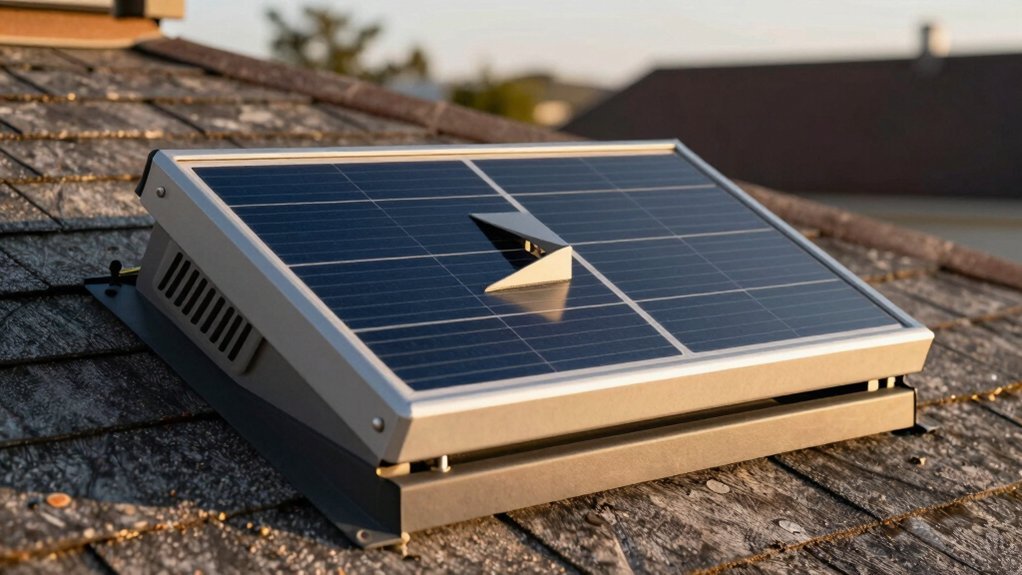
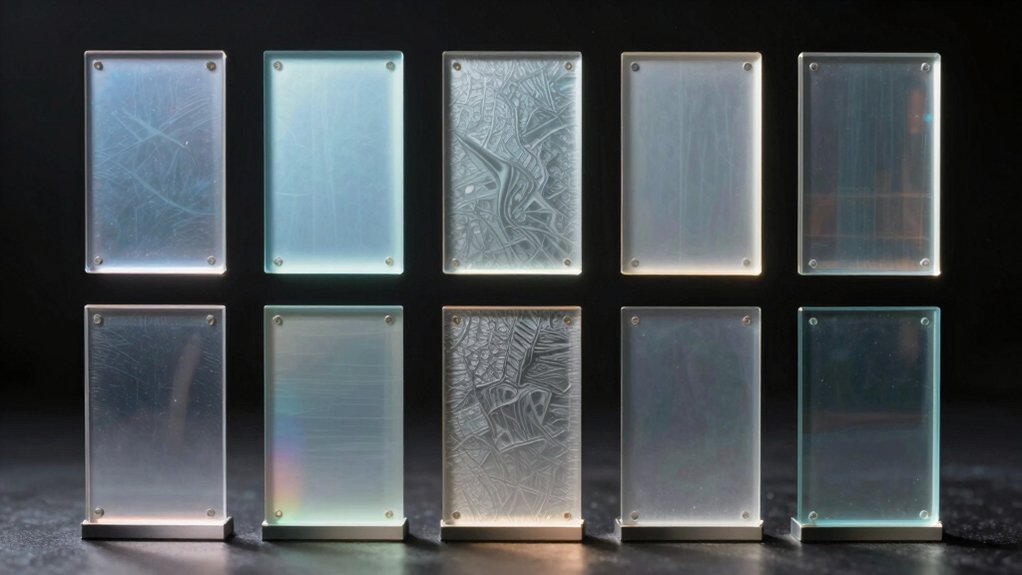
Leave a Reply